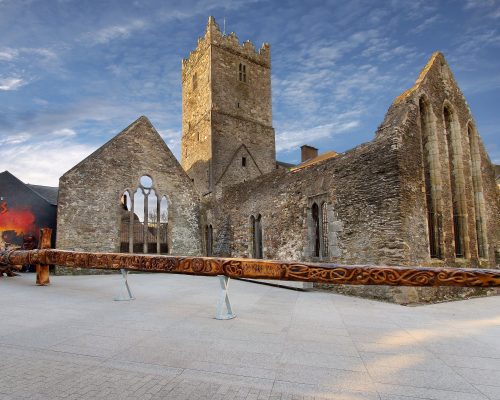Some Restrictions Being Lifted
Public health measures in place from 18 May to control the spread of COVID-19
Published: 15 May 2020
From: Department of Health and Department of the Taoiseach
COVID-19 is a highly infectious disease. Everyone is urged to stay home wherever possible. Staying at home is the best way to minimise the spread of COVID-19 to ourselves, our families and our vulnerable people.
On 18 May 2020, new guidelines will come into place as part of Phase 1 of the government’s roadmap for reopening society and business. Under these guidelines people can leave their home for a wider range of reasons and will be able to meet in small groups outdoors.
Social distancing guidelines are to be maintained at all times during this Phase.
Everyone is advised to:
- wash your hands well with and often to avoid contamination
- cover your mouth and nose with a tissue or bent elbow when coughing or sneezing, and discard of used tissue safely
- limit your contact with others when out and about
- distance yourself at least 2 metres away from other people, especially those who might be unwell
- avoid crowded areas. If an area looks busy, go somewhere else or return at a quieter time
- wear a face covering in some situations where social distancing is not possible, for example in shops or on busy public transport. Wearing of cloth face coverings may help prevent people who do not know they have the virus from spreading it to others. Guidance on safe use of face coverings can be accessed here
Know the symptoms of COVID-19. If you have them, self-isolate and contact a GP.
The symptoms are:
- a fever (high temperature – 38 degrees Celsius or above)
- a cough – this can be any kind of cough, not just dry
- shortness of breath or breathing difficulties
Stay at home
You should still stay at home whenever possible and only travel for essential reasons.
This is the best way to minimise the risk of COVID-19 to your friends, families and communities.
You can leave your home to buy food, attend medical appointments and even get out for some exercise. From 18 May you can also leave your house to meet outdoors in groups of up to four people.
For people who are cocooning, there are no changes to the public health advice from 18 May. COVID-19 is a highly infectious illness and people who are extremely medically vulnerable and people over 70 need to be especially vigilant to protect themselves as they are at the highest risk of severe illness from COVID-19.
If you are cocooning, you should continue to follow the public health advice to stay at home as much as possible and avoid physical contact with other people, except to leave home for exercise or a drive up to 5 kilometres. Guidance for those who are cocooning can be found here.
The only reasons you can leave your home
Stay at home in all circumstances, except in the following situations:
- to travel to and from work, if your work cannot be carried out from home
- to shop for essential food and household goods
- to attend medical appointments and collect medicines and other health products
- for vital family reasons, such as providing care to children, elderly or vulnerable people, but excluding social family visits
- for farming purposes, that is food production or care of animals
- to engage in physical exercise within 5 kilometres of the home, adhering to strict 2 metre social distancing
From 18 May 2020 you can also leave your home to avail of the expanded list of essential retail services as set out under the retail, personal services and commercial activities heading below.
Small groups outdoors
From 18 May 2020 groups of up to four people who are not from the same household may meet outdoors. This could include a family meeting an individual friend or neighbour, a group of individuals meeting outdoors, two couples meeting outdoors and so on.
Strict social distancing should be maintained with all people keeping at least 2 metres apart.
Meetings should be within the 5 kilometre limit from the households of those involved.
You are advised to limit the number of people you meet with outdoors. The more contact you have – the greater risk there is of getting and spreading the virus.
Cultural and social measures
From 18 May 2020, outdoor public amenities and tourism sites such as parks, beaches, mountain walks, heritage and cultural sites can reopen.
Outdoor sports facilities such as pitches, tennis courts and golf courses can also reopen.
Strict social distancing measures must be implemented at all these sites.
People may practice sport or fitness activities in groups of up to four people but they must practice social distancing, minimise contact, not share equipment and practice strict hygiene.
People should not travel beyond 5 kilometres from where they live to visit any of the above facilities.
Education and childcare measures
From 18 May 2020 school and college buildings can reopen for access by teachers for organisation and distribution of learning materials.

Workers
Anyone who can work from home should continue to do so. This includes essential workers whether they work in essential government, utilities or other services.
From 18 May 2020 a phased return to work for outdoor workers will begin. This includes construction workers, gardeners and so on. A full list of occupations covered by this advice can be accessed here.
Employers are advised to apply the Return to Work Safely Protocol. This has been designed to support employers and workers to put measures in place that will prevent the spread of COVID-19 in the workplace. Employers should also have a COVID-19 Response Plan in place.
Employers should put measures in place in the workplace to reduce the number of workers interacting with each other onsite at work at any one time. These could include having a smaller number of workers return initially, shift work, staggered hours and so on.
Workplaces should be adequately prepared for the return of workers. Public health advice to limit the spread of COVID-19 (hand hygiene, good respiratory etiquette, social distancing, wearing of face coverings) should be communicated to all staff. Cleaning schedules, waste disposal arrangements, arrangements to encourage social distancing between workers and alternative arrangements where social distancing is not always possible should be implemented.
If you are feeling sick you should stay at home and not go to work.
If you have been in contact with a confirmed or suspected case of COVID-19 you should stay at home and not go to work.
Employers are advised to proactively engage with official authorities as they reopen and to consult with public health authorities on ways to minimise the risk of a COVID-19 outbreak within the workplace.
Retail, personal and commercial activities
From 18 May 2020 additional retailers will be allowed to reopen. All must implement social distancing arrangements in their premises to reduce the risk of COVID-19 transmission. All must also apply the Return to Work Safely Protocol.
Retail outlets covered by these new arrangements include:
1. Retail outlets that are primarily outdoor (for example, garden centres, farmer’s markets, hardware stores and so on) may reopen
2. Retail outlets, in addition to those that are currently open.
These include:
- opticians and optometrists, outlets providing hearing test services, selling hearing aids and appliances
- retailers involved in the sale, supply and repair of motor vehicles, motorcycles and bicycle repair and related facilities
- hardware stores, builders’ merchants and stores that provide hardware products necessary for home and business maintenance, sanitation and farm equipment, supplies and tools essential for gardening / farming /agriculture
- retail sale of office products and services for individuals working from home and for businesses
- retailers providing electrical, IT and phone sales, repair and maintenance services for home and businesses
Retailers must put measures in place in their stores to minimise the spread of infection among customers and staff. These could include protective screens and barriers, operating new queueing approaches, limiting the number of customers and staff per store at any one time, providing cleaning stations, increasing store cleaning and hygiene, considering store layout to facilitate social distancing, extending opening hours to reduce crowding, implementing carpark restrictions, and so on.
Stores should be adequately prepared for the return of employees and customers. Public health advice to limit the spread of COVID-19 (hand hygiene, good respiratory etiquette, social distancing, wearing of face coverings) should be communicated to all staff. Cleaning schedules, waste disposal arrangements, arrangements to encourage social distancing between workers and alternative arrangements where social distancing is not always possible should be implemented.
If you are feeling sick you should stay at home and not go to work.
If you have been in contact with a confirmed or suspected case of COVID-19 you should stay at home and not go to work.
Retailers are advised to proactively engage with official authorities as they reopen and to consult with public health authorities on ways to minimise the risk of a COVID-19 outbreak within their stores.
Health services
- all non-essential surgery, health procedures and other non-essential health services are postponed
- all visits to hospitals, residential healthcare centres, other residential settings or prisons are stopped with specific exemptions on compassionate grounds
- pharmacists are allowed by law to dispense medicines outside the dates spelled out in prescriptions according to their own professional judgement
Transport and travel
Travel restrictions are implemented as follows:
- there is a nationwide restriction on travel outside of 5 kilometres from your home, except for the restrictions listed above
- public transport and passenger travel is restricted to those who are buying food or medicines, carers, going to medical appointments and essential workers
- travel to Ireland’s offshore islands is limited only to residents of those islands
- local authorities have relaxed on-street parking laws to meet the travel needs of essential workers
- the arrival of personal non-national maritime leisure vessels is banned (except to exceptions as ‘port in a storm’)
The measures above will be reflected in the regulations to be made under the Health (Preservation and Protection and Other Emergency Measures in the Public Interest) Act 2000 and will be enforced by the Garda Síochána.






